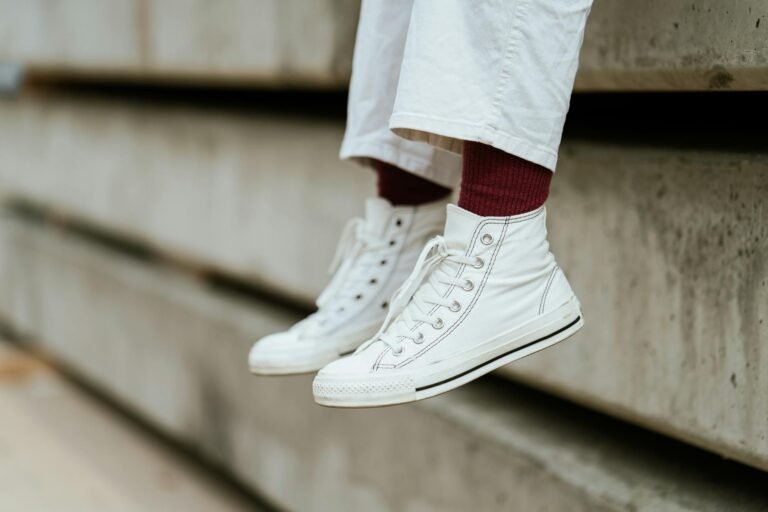Can You Wash Shoes in a Dishwasher? Risks Explained
Ever found yourself staring at a pair of mud-caked sneakers, wondering if there’s a quicker way to get them sparkling again? I’ve been there, and it’s led me to ask: Can I wash shoes in the dishwasher? It’s not as wild of an idea as it sounds, and I’m here to dive into the dos and don’ts of this unconventional cleaning hack.
While tossing your dirty dishes and a grimy pair of shoes in the same wash might raise some eyebrows, there’s a method to the madness. I’ll explore the pros and cons of using your dishwasher as a shoe-cleaning machine, ensuring you won’t end up with a footwear fiasco. Let’s get to the bottom of this and find out if your dishwasher is really your shoe’s new best friend.
Can I Wash Shoes in the Dishwasher?
When I first considered the idea of washing shoes in the dishwasher, I had my doubts. Like many, the notion of mixing dinner plates with dirty sneakers didn’t sit right with me. However, as I delved deeper, I found that dishwashers can provide an efficient and effective clean for certain types of shoes.
It’s crucial to note that not all shoes are suited for this cleaning method. Canvas and fabric shoes tend to be the best candidates. These materials can withstand the water intensity and heat that dishwashers offer. In contrast, leather or suede shoes should steer clear of dishwashers as the water and heat can cause irreversible damage.
Another concern is the wear and tear on the dishwasher. It’s essential to remove excess dirt and debris before placing shoes inside. Secure them with a dishwasher-safe shoe bag or place them on the top rack to prevent any loose parts from causing damage to the dishwasher’s internal components.
The temperature and detergent are also key factors. A gentle detergent and a low-heat setting help in preventing any potential damage to the shoes.
Here’s what you should consider before washing your shoes in the dishwasher:
- Check the material of your shoes. Only wash those that are dishwasher-safe.
- Prepare your shoes by removing excess dirt and laces.
- Use a gentle cycle with a mild detergent.
- Position your shoes properly on the top rack to avoid any damage.
Based on personal experience, washing shoes in the dishwasher can save time and restore your footwear to a like-new condition. This method has worked wonders, especially for those musty old sneakers that seem past their prime. The key lies in selecting the right shoes and settings to ensure a damage-free and thorough clean. With proper precautions, the dishwasher is not just for dishes anymore; it can become your go-to appliance for keeping your sneakers sparkling.
The Dos and Don’ts of Washing Shoes in the Dishwasher
When it comes to getting your shoes looking pristine using a dishwasher, it’s crucial to abide by certain guidelines to ensure a safe and effective clean. I’ve outlined a list of dos and don’ts to help you keep your sneakers in top shape.
Dos:
- Check the Label: Always look for the manufacturer’s cleaning instructions before proceeding. If it’s safe, then you’re good to go.
- Remove Excess Dirt: Knock off any loose mud or debris to prevent clogging your dishwasher’s filter.
- Use a Gentle Detergent: Opt for mild detergents, as harsh chemicals can ruin the integrity of the shoe fabric.
Don’ts:
- Neglect the Material: Remember, materials like leather or suede should never see the inside of a dishwasher. They’re prone to water damage.
- Overlook Placement: Position your shoes securely on the top rack to avoid them being tossed around during the wash cycle.
- Forget to Remove Laces and Insoles: Doing so allows a more thorough clean and prevents any potential damage to your shoes or the appliance.
While preparing your shoes for the dishwasher, it’s also beneficial to understand that regular dishwasher cleaning might not be ideal for every pair. Consider this method as an occasional time-saver rather than a routine practice.
Pros of Using Your Dishwasher to Clean Shoes
Washing shoes in the dishwasher might seem unconventional, but it’s a method that has gained popularity for those looking to save time and ensure a deep clean. Having tried this technique myself, I can share firsthand the benefits it offers.
One significant advantage is efficiency. Your dishwasher can cleanse multiple pairs of shoes at once, saving you the hassle of scrubbing them by hand. It’s a real time-saver for those with active lifestyles who need to refresh their sneakers regularly. By loading your dishwasher with shoes, you’re harnessing a multitasking marvel that’s already a fixture in your home.
Not to be overlooked is the consistency of the clean. Dishwashers are designed to deliver a thorough wash cycle that tackles grime from every nook and cranny. When I place my shoes on the top rack, I’m confident that the spray arms will reach all the hard-to-clean spots that I might miss with a manual scrub.
Moreover, the sanitization aspect cannot be understated. Dishwashers use hot water, which helps eliminate bacteria and odors far more effectively than cold water alone. For gym shoes that have seen their fair share of workouts, this can be a game-changer in maintaining freshness.
Let’s not forget about the gentle detergent options. With the right dishwasher pod, you’re pampering your shoes with a delicate wash that’s tough on dirt but not on the shoes themselves. This is particularly useful for those specialty athletic shoes that demand a gentler touch.
| Key Benefit | Description |
|---|---|
| Efficiency | Cleans multiple pairs at once, saves time |
| Consistency | Reaches tough spots, thorough clean |
| Sanitization | Hot water eliminates bacteria and odors |
| Gentle Clean | Specialty detergents protect the shoes |
Remember, these benefits are most potent when the guidelines for washing shoes in your dishwasher are followed to the letter. By doing so, your footwear gets the care it needs without the wear and tear you’d rather avoid.
Cons of Using Your Dishwasher to Clean Shoes
While the idea of popping your shoes into the dishwasher might sound like a slick hack, it’s not without its drawbacks. First and foremost, throwing shoes into the dishwasher can actually cause damage to both your shoes and your appliance. The heat and the aggressive water action that work wonders on dirty plates could wreak havoc on the glue and materials holding your shoes together.
Let’s talk materials: Shoes are often made with a variety of components. Leather, for example, can warp and crack when exposed to high heat and excessive water. Athletic shoes might survive the wash, but often they come out misshapen or with weakened seams.
Another critical point is the potential contamination hazard. Think about it – dishwashers are designed to clean dishes from which you eat. Introducing shoes can spread dirt and bacteria, potentially causing a hygiene issue inside an appliance intended for cleaning items related to food.
And let’s not forget about the noise. Shoes tumbling around in a dishwasher can be loud, disruptive, and can even chip or damage the racks and spray arms within the machine. It’s why laces need to be secured or removed and shoes placed in a mesh bag or dishwasher-safe container to minimize these risks.
Here’s a breakdown of the key drawbacks of using a dishwasher to clean shoes:
- Potential Damage to Shoes and Dishwasher: High heat and water pressure can cause materials to warp, crack, or come unglued.
- Material-specific Risks: Leather, suede, and other delicate materials are at high risk of damage.
- Cross-contamination: Shoes can introduce dirt and bacteria into your kitchenware cleaning appliance.
- Noise and Disruption: Shoes can be loud inside the machine, risking damage to the dishwasher’s interior.
It’s evident that the cons of putting shoes in the dishwasher are significant. While the convenience might be tempting, the risks could outweigh the benefits. If you’re considering using this method, be sure to weigh these factors carefully against the potential efficiency gains outlined earlier.
Is Your Dishwasher Really Your Shoe’s New Best Friend?
When we think about cleaning shoes, a dishwasher might not be the first solution that pops into mind. Yet, it’s a method some people swear by. But is it safe or effective? I’ve taken a deep dive into whether your dishwasher should double as a shoe-cleaning appliance.
Your dishwasher is designed to release high-pressure hot water and detergents to clean dishes and kitchenware. It’s not calibrated for items like shoes, which have diverse materials and construction. The vigorous water action and heat conducive to killing germs on dishes are precisely what can wreak havoc on your footwear. Shoe materials aren’t designed to withstand these conditions and can degrade quickly.
But let’s escalate this to personal experience. I once tried washing a sturdy pair of canvas sneakers in my trusty dishwasher. Post-cycle, the colors had faded, and the shape wasn’t the same— they’d become warped. Imagine this happening to more delicate materials, like mesh or leather, which are prone to absorbing water and odors.
Moreover, think about the food residue, soap, and heat inside your dishwasher. It can lead to unwelcome guests—mold and bacteria—that can thrive in the moist, warm environment you’ve created by introducing damp shoes. That’s a big no-no, especially if you have sensitive skin or allergies.
Reflect on the noise too. Shoes banging against the racks and walls during a cycle aren’t like clinking plates and utensils; it’s so much louder and can cause unnecessary disturbance. Not to forget, this forceful interaction isn’t just noisy but also potentially damaging to both your dishwasher’s interior and the shoes themselves.
So, before you place your dirty shoes next to your cutlery, pots, and pans, it’s worth considering these points. Washing shoes in the dishwasher isn’t recommended for multiple reasons—safety, effectiveness, and the well-being of the dishwasher and shoes alike. It turns out, your dishwasher might not be the faithful ally for your shoes after all.
Conclusion
I’ve explored the reasons why washing shoes in the dishwasher isn’t the best idea. It’s clear that the potential harm to your shoes and the machine itself outweighs any convenience. There’s also the risk of unsanitary outcomes from cross-contamination. For those reasons, I recommend sticking to traditional cleaning methods that are safer for your footwear and your dishwasher. Trust me, your shoes and your kitchen appliances will thank you for it.









[…] turn on a dime, and it’s these split-second changes in direction that put players at a higher risk for slips and falls if their shoes aren’t up to […]
[…] As an avid dancer, I often get asked whether it’s safe to wash jazz shoes. Understandably, no one wants to step onto the dance floor with dirty shoes, but at the same time, the fear of ruining them is real. So here’s the scoop: yes, you can wash jazz shoes, but there’s a catch. The method of washing them depends on the material of the shoes. […]
[…] the wrong shoes during sports activities can increase the risk of various injuries, including meniscus tears. Incorrect footwear may not provide the necessary […]